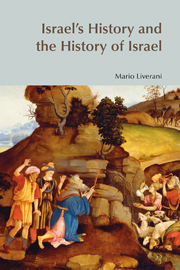Book contents
- Frontmatter
- Dedication
- Contents
- List of Tables and Illustrations
- Foreword
- Abbreviations
- IMPRINTING
- Part I A NORMAL HISTORY
- INTERMEZZO
- Chapter 10 THE AXIAL AGE
- Chapter 11 THE DIASPORA
- Chapter 12 THE WASTE LAND
- Part II AN INVENTED HISTORY
- EPILOGUE
- Bibliography
- Index of References
- Index of Names of Persons and Deities
- Index of Placenames
Chapter 10 - THE AXIAL AGE
from INTERMEZZO
- Frontmatter
- Dedication
- Contents
- List of Tables and Illustrations
- Foreword
- Abbreviations
- IMPRINTING
- Part I A NORMAL HISTORY
- INTERMEZZO
- Chapter 10 THE AXIAL AGE
- Chapter 11 THE DIASPORA
- Chapter 12 THE WASTE LAND
- Part II AN INVENTED HISTORY
- EPILOGUE
- Bibliography
- Index of References
- Index of Names of Persons and Deities
- Index of Placenames
Summary
The Individual and the ‘Distant Power’
The sixth century is an important turning-point not only for Israel, but a so for a large part of the ancient world. It is the so-called ‘axial age’, marked by the rising of a series of innovators (personified symbols of general tendencies in their respective communities): in China, Confucius (550–480), in India, Buddha (560–480), in Iran, Zoroaster (end of the seventh century), in Greece the Ionian philosophers and ‘scientists’, who began philosophy, tragedy and historiography. In Israel we have the major ‘ethical’ prophets (such as Ezekiel and Second Isaiah) of the exilic period. The protagonists and tendencies of the ‘axial age’ are different from each other, because of their cultural background and the specific traditions and tendencies of each culture; also different are the innovative directions that they take, ranging from rationality to ethics. Not all historians agree with the concept of the ‘axial age’, nor of its value as a cognitive tool, that risks becoming something meta-historical if it is not set against the background of precise historical conditions. If it is not merely a coincidence, or a curiosity, the same fruit ought to spring from the same kind of soil, since it produces the same deepening of the role of the individual, signifying a major break with previous ways of life.
- Type
- Chapter
- Information
- Israel's History and the History of Israel , pp. 203 - 213Publisher: Acumen PublishingPrint publication year: 2005

